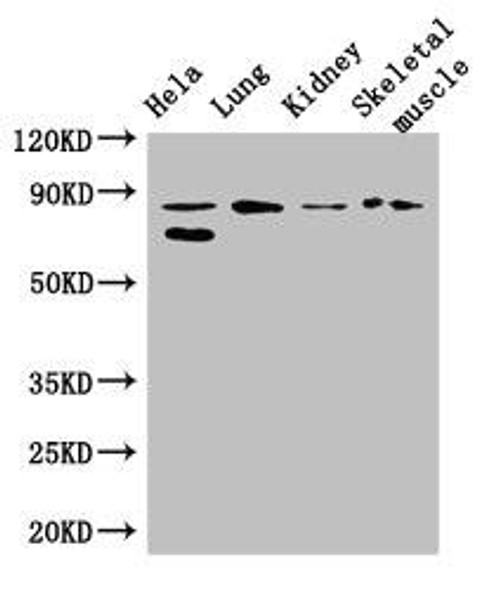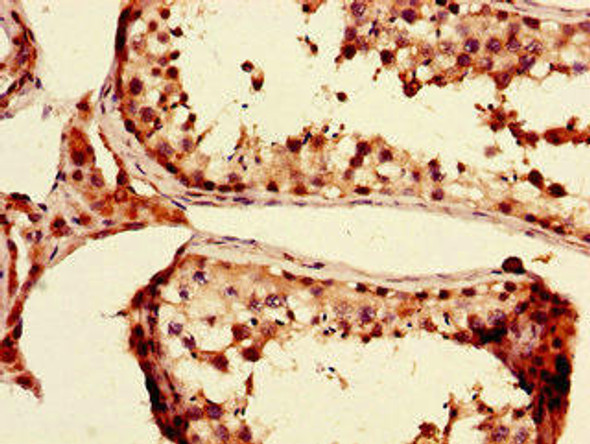PRDM4 Antibody (PACO11450)
- SKU:
- PACO11450
- Product Type:
- Antibody
- Reactivity:
- Human
- Mouse
- Rat
- Host Species:
- Rabbit
- Isotype:
- IgG
- Applications:
- ELISA
- WB
- Antibody Type:
- Polyclonal Antibody
- Conjugation:
- Unconjugated
Frequently bought together:
Description
| Antibody Name: | PRDM4 Antibody (PACO11450) |
| Antibody SKU: | PACO11450 |
| Size: | 50ul |
| Host Species: | Rabbit |
| Tested Applications: | ELISA, WB |
| Recommended Dilutions: | |
| Species Reactivity: | Human, Mouse, Rat |
| Immunogen: | Human PRDM4 |
| Form: | Liquid |
| Storage Buffer: | PBS with 0.1% Sodium Azide, 50% Glycerol, pH 7.3. -20°C, Avoid freeze / thaw cycles. |
| Purification Method: | Antigen Affinity purified |
| Clonality: | Polyclonal |
| Isotype: | IgG |
| Conjugate: | Non-conjugated |
| Synonyms: | PR domain containing 4;PRDM4;MGC45046;PFM1 ; |
| UniProt Protein Function: | PRDM4: May function as a transcription factor involved in cell differentiation.Protein type: Methyltransferase, protein lysine, predicted; C2H2-type zinc finger proteinChromosomal Location of Human Ortholog: 12q23-q24.1Cellular Component: nucleusMolecular Function: methyltransferase activity; DNA binding; zinc ion bindingBiological Process: transcription from RNA polymerase II promoter; methylation; cell proliferation; nerve growth factor receptor signaling pathway; regulation of transcription, DNA-dependent; signal transduction; negative regulation of cell cycle |
| UniProt Protein Details: | |
| NCBI Summary: | The protein encoded by this gene is a transcription factor of the PR-domain protein family. It contains a PR-domain and multiple zinc finger motifs. Transcription factors of the PR-domain family are known to be involved in cell differentiation and tumorigenesis. An elevated expression level of this gene has been observed in PC12 cells treated with nerve growth factor, beta polypeptide (NGF). This gene is located in a chromosomal region that is thought to contain tumor suppressor genes. [provided by RefSeq, Jul 2008] |
| UniProt Code: | Q9UKN5 |
| NCBI GenInfo Identifier: | 25008960 |
| NCBI Gene ID: | 11108 |
| NCBI Accession: | Q9UKN5.3 |
| UniProt Secondary Accession: | Q9UKN5,Q9UFA6 |
| UniProt Related Accession: | Q9UKN5 |
| Molecular Weight: | 801 |
| NCBI Full Name: | PR domain zinc finger protein 4 |
| NCBI Synonym Full Names: | PR domain containing 4 |
| NCBI Official Symbol: | PRDM4 |
| NCBI Official Synonym Symbols: | PFM1 |
| NCBI Protein Information: | PR domain zinc finger protein 4; PR domain-containing protein 4; PR-domain zinc-finger protein PFM1 |
| UniProt Protein Name: | PR domain zinc finger protein 4 |
| UniProt Synonym Protein Names: | PR domain-containing protein 4 |
| Protein Family: | PR domain zinc finger protein |
| UniProt Gene Name: | PRDM4 |
| UniProt Entry Name: | PRDM4_HUMAN |




